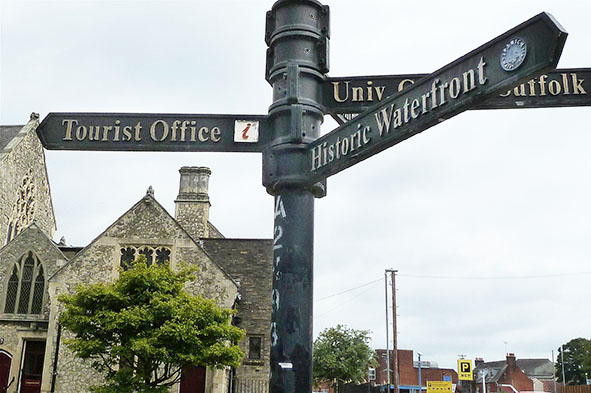- Screen Colours:
- Normal
- Black & Yellow

It is a truism that national events and Government decisions often impinge directly upon local government. The current Government policy is that those who benefit from tourists should be the ones who pay for the marketing and promotion of tourism. This policy fails when you realise that the greatest beneficiaries are the multinational hotels who have no interest in contributing to, or promoting, one area over another – where they inevitably have another hotel.
The economic conditions caused by a global pandemic – and no doubt the UK’s withdrawal from the European Union plus other factors – continue to have reverberations at local level. The reported ten million pound shortfall in the income for Ipswich Borough Council has resulted in the decision to close the Tourist Information Centre in St Stephen’s Church, Arras Square. This follows its prolonged closure during the Covid lockdowns. Its closure will save £160,000 a year: a significant saving as the council tries to close the funding gap. We should not be surprised by further cuts to our public services in the longer term.
Of course, it can be argued – and is very strongly – that promoting the town as a tourist destination through the TIC and by other means brings great financial benefits to the local economy and to the profile of Ipswich in historical and cultural terms. It is also true that footfall at St Stephen’s was falling over recent years, but certainly revived when special events and exhibitions were staged at the centre. The Borough has been performing a balancing act in this regard for some time. The TIC staff have done a wonderful job in welcoming residents and visitors alike, providing information about the town, its clubs and societies, taking bookings, selling goods and so on. As ambassadors for the town they couldn’t have done more. Perhaps they (and we) are just as much victims of social media and other means of digital communication as any presumed (or imagined) decline in interest in the town.
This might suggest that the online promotion of Ipswich in the future – which, of course, will have to be funded – will bring greater benefits than a physical tourist centre. Other places lost their tourist information centres long before the pandemic. Latest figures seem to suggest that around 12% of UK population don't use computers or the internet so local authorities (and other bodies) must ensure that they treat all residents equally and fairly, rather than relying wholly on putting everything online.
There are also knock-on effects of the Ipswich TIC closure on a number of organisations and individuals. Wes on the Sailing Barge Victor, the free monthly magazines which used the TIC as their distribution point (Grapevine, New Wolsey Theatre annual programme, ArtEast, Ipswich24, Ipswich Flyer), local authors with their individual books, local organisations, such as The Ipswich Society who used the exhibition space and sold our occasional publications, are just a few examples. Visitors ‘in the know’ also went to St Stephen because of its history as one of our medieval churches, also to view the interior, notably the wall memorial of the 16th century Lehmann family in the north-east corner of the church. In addition the Ipswich Tourist Guides have had to use The Hold on Fore Street for bookings and as a gathering/starting point for guided walks and take-up is not as it once was.
While, in 2021, we all live in these new health, social, political and economic circumstances, we will have to adapt to the changing face of our town. Ipswich does have many things in its favour over comparable towns, but the future is unclear at present. Eventually, many of the best features of Ipswich life may revive, or be replaced by something better. However, we have already lost familiar friends and gathering places and this will probably continue. Human energy, ingenuity and enthusiasm can (and will) make good things happen in bad times.
RG